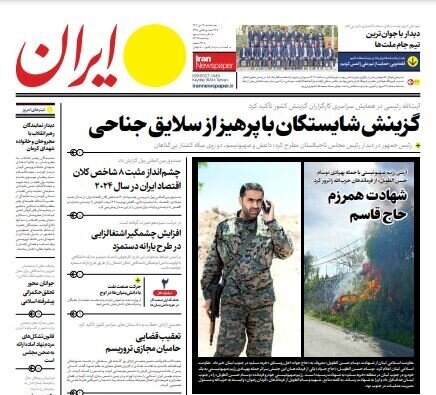Violating message with action

TEHRAN - In a note, the Iran newspaper addressed the contradictory policy of the U.S. in the region and wrote: America is sending messages to Iran repeatedly.
As Iran's Foreign Minister Hossein Amir Abdollahian said earlier, "America has sent several messages since the first days of the Zionist regime's barbaric attack on Gaza." One of the subjects was for Iran to be restrained. This was America's first request to Iran. The second issue was that the United States emphasized in its messages that it does not seek to expand the scope of the war. In almost all of these messages, America asks Iran to advise the groups in Iraq, Syria, Yemen, and the region not to take action against Israel and American bases. Iran has clearly said that it does not have any group of proxies in the region. It seems that the American and Israeli authorities should take the warning of war expansion more seriously after Tel Aviv entered the terror phase. Because this approach has brought the fragility of the developments to a peak and the U.S. Foreign Secretary should look for a solution to prevent its unpredictable dimensions in the region.
Siasat-e-Rooz: Iran is a serious competitor of arms manufacturers
In an analysis, Siasat-e-Rooz discussed the achievements of the Ministry of Defense of Iran. It wrote: Although Iran was under military sanctions for years, it was able to become one of the producers of defense military weapons by taking advantage of its domestic capabilities. Iran can export its military weapons more through regional marketing and be a serious competitor for Western products. Meanwhile, the price of Iran's weapons is more reasonable than that of the weapons of countries such as America, Russia, China, and other countries producing weapons. Iranian drones are now known in the world and have a lot of demand. Ballistic missiles, ground-to-ground, ground-to-air, sea-based, and targeted missiles, and dozens of samples of Iran's military and defense products can be exported and generate hard currency. This incident is a response to military sanctions on Iran and those who consider Iran's military achievements to be weak because the most important factor that has made the enemies not make mistakes is military progress.
Arman-e-Melli: Increasing the willingness of the parties for a nuclear agreement
In a commentary, Arman-e-Melli discussed the continuation of the process of nuclear negotiations after the developments in the region and said: It seems that the developments in the region affect the way the world views the JCPOA. Of course, it does not mean that the West does not want an understanding with Iran on the nuclear issue, but after controlling the crisis in West Asia, it seems that in order not to deepen the dispute in the region over the nuclear issue, they will probably turn to the acceleration of negotiations related to the JCPOA. The conditions of the region may influence the nuclear negotiations and make the ground of the nuclear negotiations multifaceted. These developments, of course, will change the negotiating table and its panels on the part of Iran, and it seems that a new ground will be created for negotiations in the nuclear case. According to Fereydoon Majlesi, you should not think that Iran and the West are looking for non-understanding on the nuclear issue. There are signs that Iran wants to solve its economic problems. Inflation, the bad economic situation, and the need to rebuild the country are obvious, and there is no need to continue the sanctions.
Ettelaat: Iran and regional cooperation
In an article, Ettelaat dealt with Iran's regional cooperation. It wrote: There are countries in the neighborhood of the Islamic Republic of Iran that provide the possibility of Iran's communication with the surrounding areas. On the other hand, Iran is located in a region that provides the connection of landlocked countries in three directions, the North, Central Asia (including the five republics of Turkmenistan, Tajikistan, Uzbekistan, Kazakhstan, and Kyrgyzstan), and the Caucasus (Azerbaijan and Armenia) in the east and west of Caspian Sea with international waters. Now, the Islamic Republic of Iran is experiencing cooperation within the framework of new regional organizations that are influenced by two regional land powers, China and Russia. Iran has a population with a suitable combination of trained and efficient human resources and ready for economic development. By taking advantage of these capacities, the Islamic Republic of Iran can be an independent regional power even without having a strategic ally.
